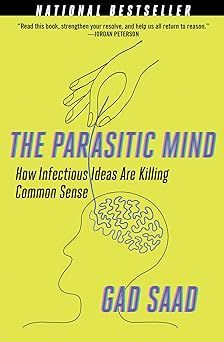
The Parasitic Mind: How Infectious Ideas Are Killing Common Sense
4.7 out of 5
4,771 global ratings
"Read this book, strengthen your resolve, and help us all return to reason." —JORDAN PETERSON
USA TODAY NATIONAL BESTSELLER
There's a war against truth... and if we don't win it, intellectual freedom will be a casualty.
The West’s commitment to freedom, reason, and true liberalism has never been more seriously threatened than it is today by the stifling forces of political correctness.
Dr. Gad Saad, the host of the enormously popular YouTube show THE SAAD TRUTH, exposes the bad ideas—what he calls “idea pathogens”—that are killing common sense and rational debate. Incubated in our universities and spread through the tyranny of political correctness, these ideas are endangering our most basic freedoms—including freedom of thought and speech.
The danger is grave, but as Dr. Saad shows, politically correct dogma is riddled with logical fallacies. We have powerful weapons to fight back with—if we have the courage to use them.
A provocative guide to defending reason and intellectual freedom and a battle cry for the preservation of our fundamental rights, The Parasitic Mind will be the most controversial and talked-about book of the year.
About the authors
Gad Saad
Dr. Gad Saad is Professor of Marketing at Concordia University (Montreal, Canada), and former holder of the Concordia University Research Chair in Evolutionary Behavioral Sciences and Darwinian Consumption (2008-2018). He has held Visiting Associate Professorships at Cornell University, Dartmouth College, and the University of California–Irvine. Dr. Saad received the Faculty of Commerce’s Distinguished Teaching Award in June 2000, and was listed as one of the ‘hot’ professors of Concordia University in both the 2001 and 2002 Maclean’s reports on Canadian universities. Saad was appointed Newsmaker of the Week of Concordia University in five consecutive years (2011-2015), and is the co-recipient of the 2015 President’s Media Outreach Award-Research Communicator of the Year (International), which goes to the professor at Concordia University whose research receives the greatest amount of global media coverage.
Read more
Reviews
OKProud
5
How to return to law and order
Reviewed in the United States on June 9, 2024
Verified Purchase
Dr Saad does an excellent job of expressing our country’s need for its citizens to stand up for what is right, stop the self-flagellation, and start again punishing criminal behavior, whoever the culprit may be. If a protest goes south and looting, burning, assault, battery, and vandalism ensues, bring in the men and women of law enforcement to stop it, and bring the law to bear against the guilty people and organizations, whatever their race, religion, gender, or sexual orientation. Take out the political leaders who interfere with the process and replace them with leaders willing to fight for it. Thanks Dr. Gaad for challenging us to do better and be better guardians of this great country of ours!
Read more
RANDY CUBILLO
5
great read!
Reviewed in the United States on June 6, 2024
Verified Purchase
i learned so much from this. i thought the West was better in handling these new unknowns. it’s laudable for someone so bravely standing up against the assault of the unacceptable and unscientific
Amazon Customer
5
Easy read, clearly shows cause and affect to most of today's chaies
Reviewed in the United States on June 8, 2024
Verified Purchase
He makes clear statements of what is happening to our society, he gives factual support as to why, and describes the solution to fix it which is rather simple: speak up, have an opinion, and don't be afraid to defend and listen to others.
That said, he does go wild with a lot of huge combo-words that slows the read down. However, it helped my scrabble game considerably :)
Read more
Ezequiel Braun Pellegrini
5
the battle of our time in simple language. recomiendo a todos
Reviewed in the United States on May 12, 2024
Verified Purchase
Simple, imposible de dejar de leer, y basado en científicamente comprobables datos. Must read for everyone. Recomendable y necesario libro
3 people found this helpful
Leib Gershon Mitchell
4
"Seemingly a Linear Combination of Many Other Books"
Reviewed in the United States on November 26, 2023
Verified Purchase
Book Review The Parasitic Mind
4/5 stars
This book feels like an expansion/rewrite of several books that I've read:
- Richard Dawkins' evolutionary concept of a meme. (The Selfish Gene.)
Viruses (nonliving entities) can take over the replication machinery of a cell in such a way that they cause destruction. And so, ideas (also nonliving entities) can take over the reasoning process of human beings in such a way that they cause massive destruction. (The author gives several real life examples of neuroparasitology. p.18)
-
Douglas Murray (Madness of Crowds)/ Heather MacDonald (Burden of Bad Ideas°°°Diversity Delusion)/ Levitt& Gross (Higher Superstition). The general inanity of left wing academia plus witch hunts against dissidents. (p.16) Universities serve as patient zero for a broad range of other dreadfully bad ideas and movements. Paul Johnson calls them "that traditional home of lost causes, the university campus. "
-
Eric Hoffer. (The True Believer.) The interchangeability of mass movements. It's a coincidence that these idiots become "Diversity and Inclusion Specialists." In another time and place, they might have been Nazis or Communists or Satmar Hasidim.
-
Ryan Anderson. (When Harry Became Sally.) Expansion of the transgender hysteria.
-
Hairy/Lukianoff. (The Coddling of the American Mind.) Opposing viewpoints constitute a form of "violence," and everyone is entitled to be safe at all times and places (p.95). Excessively safe spaces are maladaptive. Concept creep.
The author is a secular Lebanese Jew who lived through the Lebanese Civil War. (People who live through wars / the end of wars are a great source of creativity. Think Nicholas Taleb. Secular Jews also seem to be a huge source of intellectual creativity- some good, much bad. Think Noam Chomsky/ Saul Alinsky.)
Lebanese Civil War survivors are also helpful because they have lived through an event that was entirely a creation of the intelligensia: Saad draws analogies of how foolish ideas can set people who have been living in peace for many centuries against one another with disastrous consequences (p.4), such as the Lebanese civil war. (Nicholas Taleb made the exact same observation years before this book.)
Saad's betes noires are all identified within the first chapter (p.21): 1. Radical feminism; 2. Post-modernism; 3. Social constructivism; 4. Political correctness; 5. Identity politics coupled with self flagellation; 6. Culture of perpetual offense and victimhood; 7. Echo Chambers void of intellectual diversity; 8. Cultural and moral relativism.
Second order thoughts:
¶¶¶If we keep the biological analogies going, shouldn't we question that....
-
Death is a natural thing for all organisms/ societies?
-
Death is a sine qua non for all types of evolution? (Some societies have to make mistakes so that something better can come from their ashes.)
-
As organism-societies die, doesn't create room for newer and better of the same to take their place? (For example: one that understands that "academic freedom" ain't free?)
-
Won't an organism with absolutely no adaptive stressors tear itself apart? (Sitting on the couch eating too many donuts for too long will bring you to your end quicker than going out and running 10 miles a day. The Ascendant West has had a comfortable position for too long, and they have been sitting on the Metaphorical Sofa of Comfort too long.... with predictable disastrous consequences.)
So, if Western society is in the process of tearing itself apart (and that process is facilitated by its Chattering Classes / universities), then does that mean that societies that learn to keep them in check will be the ones that survive? (China. Russia.)
¶¶¶So, some number of intellectuals are all on the wrong side of something. So now what? (In point of fact, that entire book was written by Thomas Sowell. Intellectuals and Society.)
The entirety of both World Wars was an example of such miscalculation...... Plenty of death, destruction, and loss of life.
All for no ostensible reason.
And we may be headed toward the same thing all over again.
And.....so now what? Is this the first time that this has happened? (Answer: NO. Historical China and historical Tibet were both stagnant societies for in excess of 1,000 years because cognoscenti class caught onto stupid ideas.)
Idea streams and topics rehashed:
- Memetics. (Richard Dawkins.)
- System 1 and system 2. (Daniel Kahmemann.)
- Deontological versus consequentialist notions of truth. (Immanuel Kant. Jeremy Bentham.)
- Sokal Hoax is expanded into the "seven accepted grievance studies papers" (p.78).
- Cogito ergo sum-->I am a victim therefore I am.
- Popper's Falsification Principle.
- Kleptogamy. (Q: Why are all of these men at feminist rallies wimpy beta males? A: "Freud was a fool and reductionist, but sexual strategizing by losers is the source of nearly all left-wing ideology")
- Paradox of Tolerance. (Popper, again.)
Of the book:
- 191 pages of prose over eight chapters works out to ≈24 pages / chapter. Enough to read in one sitting or over a lunch break.
- Several hundred bibliographic citations.
- Some new words: epistemological dichotomania/polylogism/ kleptogamy.
The book is useful not because of novelty (as before, these ideas have been rehashed many other times and many other places), but because it is a repetition to make people aware of what is happening.
Verdict: I purchased this book for $14.99 for used copy, but since it is so much recapitulation of things that I already knew.....I will value it at about $2
Read more
13 people found this helpful
Best Sellers

The Great Alone: A Novel
4.6
-
152,447
$5.49

The Four Winds
4.6
-
156,242
$9.99

Winter Garden
4.6
-
72,838
$7.37

The Nightingale: A Novel
4.7
-
309,637
$8.61

Steve Jobs
4.7
-
24,596
$1.78

Iron Flame (The Empyrean, 2)
4.6
-
164,732
$14.99

A Court of Thorns and Roses Paperback Box Set (5 books) (A Court of Thorns and Roses, 9)
4.8
-
26,559
$37.99

Pretty Girls: A Novel
4.3
-
88,539
$3.67

The Bad Weather Friend
4.1
-
34,750
$12.78

Pucking Around: A Why Choose Hockey Romance (Jacksonville Rays Hockey)
4.3
-
41,599
$14.84

Start with Why: How Great Leaders Inspire Everyone to Take Action
4.6
-
37,152
$9.99

Tomorrow, and Tomorrow, and Tomorrow: A novel
4.4
-
95,875
$13.99
